By: Petra Chase, Arts and Culture Editor
One of the best ways to reignite your sense of wonder is by visiting an art exhibit — or three. And I’ve got your next field trip covered! Last week, we toured exhibits surrounding Vancouver, and like the sunlight that day, there was no shortage of awe and insight to soak up. These exhibits are all part of the explorASIAN Festival, which is put together by Vancouver Asian Heritage Month Society, covering events across Metro Vancouver. Supporting and tuning in to the work of Asian artists is important year-round, and Asian Heritage Month festivities present the perfect opportunity to do so!
Colour and Vibrancy
Where: Taiwanese Cultural Centre at 8853 Selkirk St, Vancouver
When: Until May 31, Mon–Fri 10:30 a.m.–4:00 p.m.
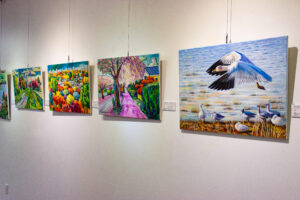
Do you need a reminder to be thankful for the cones in your eyes? In this solo exhibition, Taiwanese Canadian artist, John Wu-Tzanq Liaw’s oil paintings will do the trick. Liaw’s work consists of landscapes, silhouettes, and wildlife paintings that feel familiar yet otherworldly, as if you’re looking at the world through colour-enhancing lenses, and at times a fun-house mirror. I sat with each painting for a few minutes — drifting off into my imagination happened naturally with the tranquil atmospheres and surrealist, storybook-like style. For instance, I envisioned myself in the pastoral setting of “Familial Love,” as a bird perched on a cow’s back. Other pieces bring out the beauty in local settings: “Spring Rolls Out a Red Carpet” depicts a sidewalk decorated with pink petals like a celestial path. Liaw believes “all things in nature are beautiful to the keen observer” and seeks out to discover the “inner spirit” of nature.

You can view Liaw’s online art gallery at: https://johnliawgallery.com/gallery.php.
Where Songs Surface: Uta ga umareru basho
Where: Nikkei National Museum & Cultural Centre at 6688 Southoaks Crescent, Burnaby
When: Until September 16, Tue–Sat 10:00 a.m.–5:00 p.m. / Wed 10:00 a.m.–9:00 p.m.
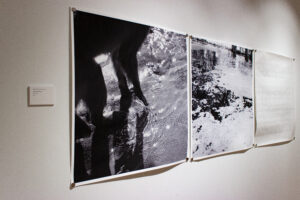
This exhibit will transport you to rural village life in Japan, introducing you to the lives of some inhabitants. It features the lens-based collections and supplemental poetry of Masako Miyazaki and Yoshimi Lee, whose works are tenderly tethered to “time, place, and memory.” Miyazaki’s photography is based on rural folklore: the Toono legend of Futtachi is about a monkey-man hybrid who’s seen as a “scary monster.” Miyazaki’s platinum-printed photography flips this notion, offering a glimpse into Futtachi’s perspective. Standing in as Futtachi for the photoshoot is a monkey named Muku, who Miyazaki photographed around Kojima Island in Japan. As Muku belonged to a lower class in the monkey hierarchy, Miyazaki wrote that “Muku’s feelings also mirror my own difficult experiences as a recent immigrant.” His contemplative demeanor, reflected in the vast, surrounding nature, captures feelings of “depression, anger, and hope.”

Lee’s work is nestled in a closed-off nook in the gallery, where you’re invited to sit on a straw stool, breathe in the breezy, serene moments projected onto the wall, and take part in a meditative visualization. The collection of short videos take you through Irokawa, a village with a population of around 400. Ambient sounds of nature, waterfalls, and footsteps up the mountains; a spark flickering and disappearing into darkness, a dog basking under the sun in deep sleep, and a curtain flowing in an open doorway — you feel almost as if you’re there. In a poem, Lee writes: My ancestors never visited Irokawa / Why does this place feel so familiar? [ . . . ] This is the hometown of our dreams.” In contrast to the bustling city life of Canada where she immigrated to from France, there is a sense of peace and gratitude that Lee exudes in tracing the footsteps of her ancestors to this quaint village with her daughters.
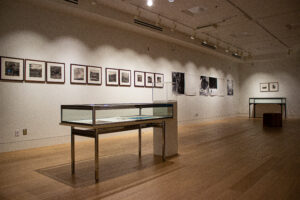
Pro tip: Grab a snack and some groceries from the Japanese food store outside of the museum, take a breather in the garden out front, and don’t miss out on the Japanese book store upstairs!
a small but comfy house and maybe a dog
Where: Richmond Art Gallery at 7700 Minoru Gate #180, Richmond
When: Until June 11, Mon–Fri 10:00 a.m.–6:00 p.m. / Sat–Sun 12:00 p.m.–5:00 p.m.
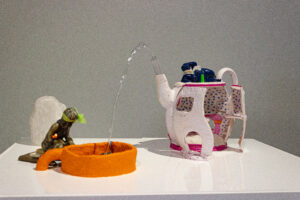
The title is a quote from a letter Amy Chin-Yan Lam, artist and writer, wrote and put in a time capsule at the age of 11. We probably spent the longest time at this exhibit; the eclectic installments and writings, linking Lam’s childhood self with her adult self and history with the present, came together like puzzle pieces. Deconstructed teapots and hollowed-out gourds furnished like dollhouses, an entry in her grade school newspaper about women taking over the world, and a USB shoplifted from the British Museum gift shop showcase Lam’s spunky personality.
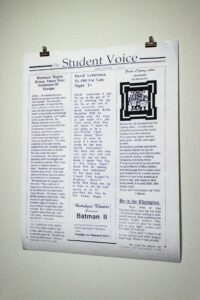
Of course, the first thing you will see is an animation loop of an adorable sleeping dog. I quickly learned that this dog is based on Lam’s short novel, Looty Goes to Heaven, which is based on the true story of a Pekingese dog named “Looty” who was stolen by British colonizers in Beijing during the Opium Wars in 1860 and gifted to Queen Victoria. The name “Looty” references the word “loot” describing objects stolen during war. This story points out the link between dog breeding and Western eugenics, which tie back to the theme of colonialism. Ironically framed in the exhibit is the rejection letter from Buckingham Palace to loan the exhibit a painting of Looty that was originally stolen from Beijing.
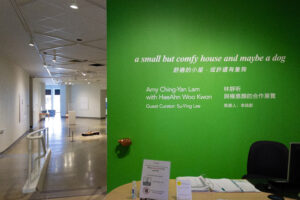
Purchase Looty Goes to Heaven online at Art Metropole’s website for $12. Support Lam on her website, https://amylam.me/ and Instagram, @amychingyan.




